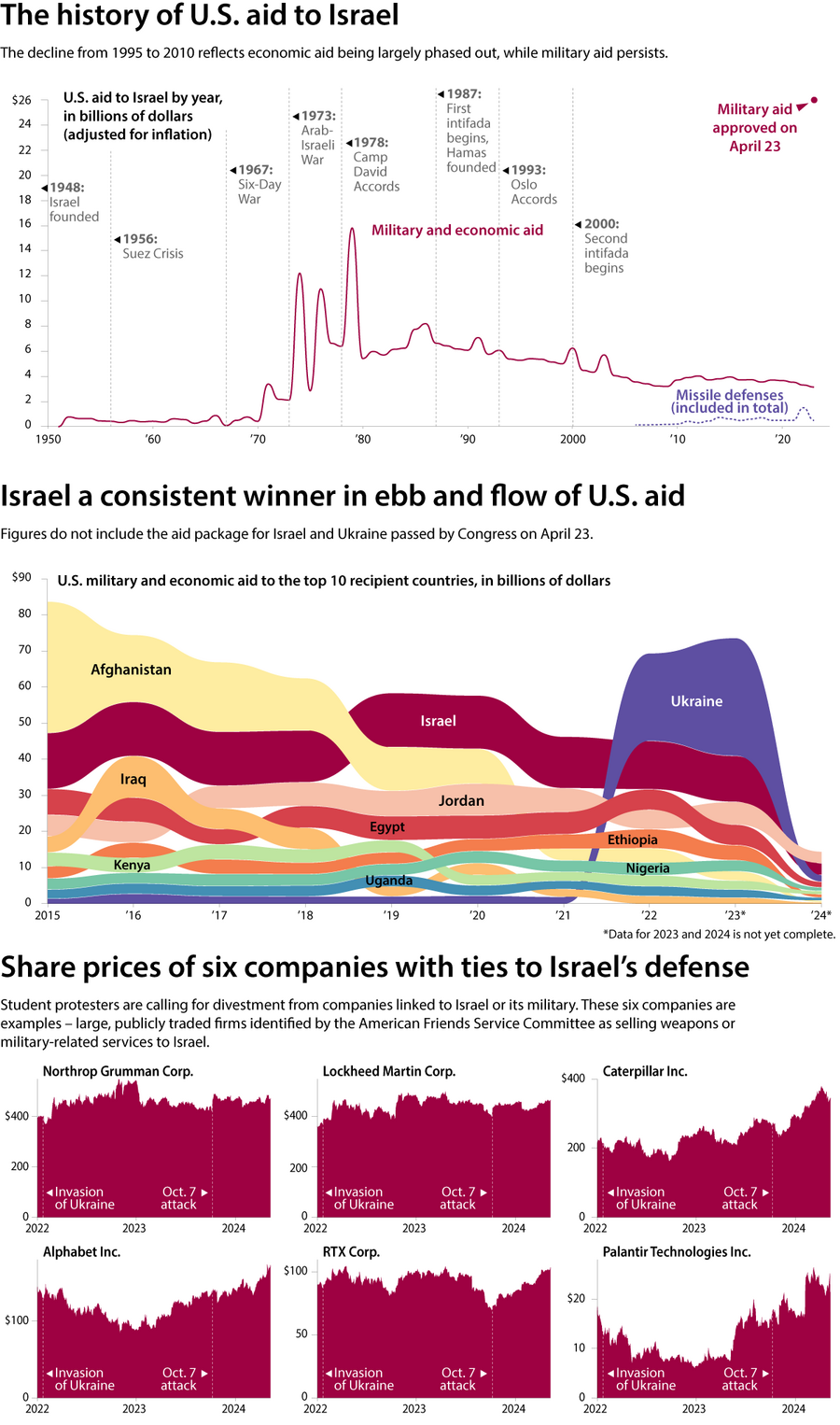Israel arms shipment on hold as US weighs new accountability
Loading...
Seven months into the war in Gaza, on the cusp of a possible cease-fire, the United States is taking a more cautionary stance on military aid to Israel.
Last week, President Joe Biden paused a shipment of 3,500 bombs to Israel out of concern they would be used in a planned invasion of Rafah in southern Gaza, according to administration officials. This is the first time since the Oct. 7 attack on Israel by Hamas that the U.S. has put military aid on hold in order to send a message about Israel’s military response.
Why We Wrote This
The role of the United States as a major backer of the Israeli military is coming under rare and rising scrutiny due to the war in Gaza. Our charts put the debate in context.
Overall U.S. political support for Israel remains strong. Yet Israel’s conduct in Gaza has prompted growing concern about the way U.S. funding and arms are being used.
This week, the Biden administration is expected to inform Congress about whether it believes Israel has broken international or U.S. laws in Gaza.
This moment may mark a turning point in how U.S. aid to Israel will be administered, says Linda Robinson, a senior fellow at the Council on Foreign Relations. “Longtime supporters of Israel,” she says, “have now come to the realization that it does the U.S. and Israel no good to apply this blanket support for Israel, which has really cost Israel in the court of world opinion.”
Seven months into the war in Gaza, on the cusp of a possible cease-fire, the United States is taking a more cautionary stance toward the military aid it provides Israel.
Last week, President Joe Biden paused a shipment of 3,500 bombs to Israel out of concern that they would be used in a planned invasion of Rafah in southern Gaza, according to administration officials. This is the first time since the Oct. 7 attack on Israel by Hamas that the U.S. has put military aid on hold in order to send a message about Israel’s military response.
And President Biden said today in a CNN interview that, while the U.S. is committed to Israel's defense, if Israel goes into Rafah “we’re not going to supply the weapons and artillery shells used,” due to concerns for civilian lives at risk.
Why We Wrote This
The role of the United States as a major backer of the Israeli military is coming under rare and rising scrutiny due to the war in Gaza. Our charts put the debate in context.
The U.S. has long been Israel’s strongest diplomatic and military ally, and overall political support remains strong. At the end of April, President Biden signed an unprecedented $26 billion aid bill destined for Israel.
Yet Israel’s conduct in Gaza, where health authorities are reporting a death toll of over 34,000, has prompted growing concern about the way U.S. funding and arms are being used. Public opposition to Israel’s actions has intensified, especially on university campuses in the U.S. and abroad as students call for divestment from Israel.
Voices within the Democratic Party have called for Mr. Biden to take into consideration Israel’s conduct as a condition for providing aid.
At the same time, questions are surfacing about whether aid has already been violating U.S. laws such as the Leahy Act, which prohibits the U.S. from providing military aid if there is credible evidence of gross human rights violations.
This week, the Biden administration is expected to inform Congress about whether it believes Israel has broken international or U.S. laws in Gaza.
Some analysts say this moment marks a turning point in how U.S. aid to Israel will be administered going forward.
“It reflects this sea change,” says Linda Robinson, a senior fellow at the Council on Foreign Relations. “Longtime supporters of Israel have now come to the realization that it does the U.S. and Israel no good to apply this blanket support for Israel, which has really cost Israel in the court of world opinion.”
Concern among U.S. lawmakers swelled following an Israeli airstrike that killed seven World Central Kitchen aid workers on April 1. Forty Democratic members of Congress, including longtime Israel supporter Nancy Pelosi, wrote a letter to President Biden urging him to withhold “unjustifiable” arms transfers until an investigation could be conducted into the incident.
Israel receives a standing $3.8 billion each year from the U.S, making it the largest recipient of American military aid. The latest package includes $5.2 billion for Israel’s Iron Dome defense system, $3.5 billion for arms purchases, $4.4 billion for other defense supplies and services, and $1 billion for weapons production. The Biden administration has reportedly authorized over 100 separate military sales to Israel since Oct. 7, though only two have been made public.
Aaron Stein, president of the Foreign Policy Research Institute, says the latest round of military aid to Israel is needed for “keeping elements of their military whole [for] the defense of the country.”
Proving that Israel has broken international laws of warfare using U.S. supplies is sticky. “Once the weapon leaves the United States, and it’s given to somebody else, the oversight ... is negligible,” he adds.
While nearly 6 in 10 Americans in a Pew Research Center poll say Israel’s reasons for fighting Hamas are valid, a recent Gallup survey finds that a majority – 55% – now disapprove of Israel’s military action in Gaza.
Charles Blaha, who oversaw human rights compliance by recipients of U.S. military assistance until last August, recently spoke out about repeated cases of “special treatment” Israel has received in response to allegations of Israeli military abuses of Palestinians. Last October, Josh Paul resigned from his post overseeing arms transfers to foreign militaries in protest of the U.S. “rushing” arms to Israel without sufficient debate.
“If there’s no accountability [for the Israeli military] and we continue to supply arms, then ultimately our governments are culpable of – at the very least – negligence,” says Iain Overton, executive director of the London-based nonprofit Action on Armed Violence. “But at the very worst, I’d say we’re in step with the same level of abuse.”
The foreign aid bill contains $9 billion in humanitarian relief for war-torn regions, including an expected $2 billion for residents of Gaza.
Editor's note: This article has been updated with a new third paragraph, with President Biden's comment on a possible invasion of Rafah.








